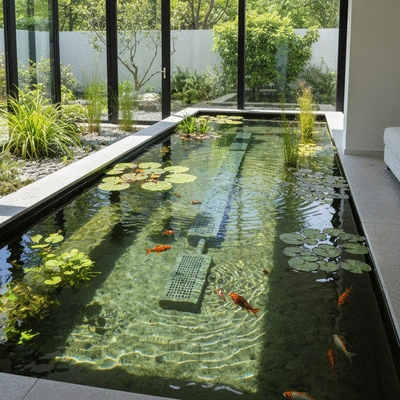Support Resources During Chemotherapy
By Dr. Elise Carter / Jan 28
When it comes to maintaining a healthy and vibrant pond, proper filtration is key. Pond filters play a crucial role in removing debris, excess nutrients, and harmful toxins, ensuring crystal-clear water and a thriving aquatic ecosystem. With a wide array of pond filters available on the market, choosing the right one can be a daunting task. This comprehensive guide will delve into the world of pond filters, exploring their different types, key features, and how to select the best one for your specific needs.
Understanding the different types of pond filters is the first step toward making an informed decision. Each type offers unique advantages and is designed to address specific pond challenges:
Mechanical filters are designed to physically remove solid debris from the pond water. They typically consist of sponges, filter pads, or brushes that trap particles like leaves, uneaten food, and fish waste. By removing these larger particles, mechanical filters prevent them from breaking down and releasing harmful compounds into the water. Regular cleaning or replacement of the filter media is essential to maintain their effectiveness.
Biological filters are arguably the most important type of pond filter. They house beneficial bacteria that convert toxic ammonia and nitrites (byproducts of fish waste and decaying organic matter) into less harmful nitrates. These bacteria colonize on various media, such as bio-balls, ceramic rings, or lava rock, providing a large surface area for their growth. A well-established biological filter is crucial for maintaining stable water parameters and preventing fish health issues.
UV sterilizers use ultraviolet light to kill single-celled algae, bacteria, and other harmful microorganisms floating in the pond water. As water passes through the UV unit, the UV-C light disrupts the DNA of these organisms, preventing them from reproducing and causing green water or disease. UV sterilizers are highly effective at maintaining clear water, but they do not remove solid debris or provide biological filtration.
Pressurized filters combine mechanical, biological, and often UV filtration into a single, compact unit. They are sealed and can be placed above or below ground, making them versatile for various pond setups. Water is pumped through the filter under pressure, allowing for efficient cleaning and backwashing. These filters are popular for their ease of maintenance and ability to handle moderate to large ponds.
Gravity filters, also known as multi-chamber filters, rely on gravity to move water through different filtration stages. Water enters the filter from the pond, passes through mechanical and biological media, and then flows back into the pond. These filters are often larger and require more space but are highly effective for larger ponds and offer excellent biological filtration.
Choosing the right pond filter involves considering several factors to ensure it meets the specific needs of your pond:
The size of your pond and the number of fish it houses are critical determinants. Larger ponds with a higher fish load will require more powerful and efficient filtration systems. Manufacturers typically provide guidelines on the maximum pond volume and fish capacity their filters can handle. It's always a good idea to choose a filter that is slightly oversized for your pond to ensure optimal performance.
The type of pond you have also plays a role. A dedicated koi pond, for instance, will require more robust biological filtration due to the high waste production of koi. A wildlife pond, on the other hand, might benefit from a more natural approach with less emphasis on mechanical filtration. Water gardens with many plants may need less filtration as plants naturally absorb nitrates.
Consider how much time and effort you're willing to dedicate to filter maintenance. Some filters, like pressurized filters with backwash features, are designed for easy cleaning, while others may require more hands-on attention. Regular maintenance is crucial for any filter to function effectively, so choose a system that aligns with your maintenance preferences.
Pond filters come in a wide range of prices. While it's tempting to opt for the cheapest option, investing in a high-quality filter will save you time and money in the long run. A good filter will provide reliable performance, reduce the need for frequent water treatments, and ensure a healthier pond environment. Balance your budget with the need for an effective and durable filtration system.
Proper installation and regular maintenance are essential for maximizing the effectiveness and longevity of your pond filter:
By understanding the different types of pond filters, considering your pond's specific needs, and committing to regular maintenance, you can ensure a beautiful, healthy, and thriving aquatic environment for years to come. A well-chosen and properly maintained pond filter is an investment in the beauty and ecological balance of your backyard oasis.



 Support Resources During Chemotherapy
Did you know that support resources can significantly ease the journey through chemotherapy? Underst
Support Resources During Chemotherapy
Did you know that support resources can significantly ease the journey through chemotherapy? Underst
 Supporting Mental Health in Chemotherapy
When you think about cancer treatment, how often do you consider the emotional toll it takes on pati
Supporting Mental Health in Chemotherapy
When you think about cancer treatment, how often do you consider the emotional toll it takes on pati
 Chemotherapy's Impact on Relationships
Have you ever considered how a cancer diagnosis can reshape the relationships around you? The emotio
Chemotherapy's Impact on Relationships
Have you ever considered how a cancer diagnosis can reshape the relationships around you? The emotio